
Kindergarten Curriculum
Your Homeschool, Your Way™. From the creators of ABCmouse®.

Customizable
learning environment for homeschool success

Engaging
online courses in Reading, Math, and more

Flexible
online & offline lessons to support your schedule

Convenient
flexible yearly or monthly subscription options
A Flexible Kindergarten Curriculum for Your Homeschool
The Homeschool+ kindergarten curriculum is an engaging online educational program designed to nurture and inspire your kindergartener as they embark on an exciting journey of learning and discovery.
We know how important it is to provide a strong foundation for your child’s early education, and that’s why we have carefully crafted a homeschool curriculum to spark their curiosity, develop their cognitive and foundational skills, and foster a love for learning.
With a blend of interactive online activities, captivating stories, and hands-on experiences, the Homeschool+ curriculum is designed to support you, the home educator, in creating a tailored learning environment where your child can thrive and develop a solid foundation for future learning.
What Skills Can My Kindergartener Learn with the Homeschool+ Curriculum?
Homeschool+ curriculum offers fully adaptive math and reading programs for children ages 4 to 8, along with an abundance of engaging online courses covering art, science, social studies, language arts, Spanish, and music. We also provide you with robust home educator tools, like a Lesson Planner and Progress Tracker, that can help support your homeschooling goals.
Here are a few of the important skills our curriculum is designed to teach your kindergartener.
Language and Literacy Development
- Alphabet recognition
- Phonics and early reading skills
Numeracy and Mathematical Concepts
- Basic number sense and counting
- Pattern and shape recognition
Fine Motor Skills
- Writing letters and numbers
- Cutting and tracing skills
Creative Expression
- Mixing colors and creating expressive art
- Music appreciation and exploration
Kindergarten Reading Curriculum
We know developing early literacy skills and a love for reading in young children is important for future academic success. The Homeschool+ online reading curriculum, My Reading Academy™, is an adaptive reading program that adjusts to your child’s level and provides a supportive reading environment with a range of leveled books.
My Reading Academy focuses on phonemic awareness, letter recognition, and decoding skills through interactive activities and guided reading sessions. Our reading program is designed to help kindergarteners gain confidence, fluency, and comprehension abilities, setting the foundation for a lifelong love of reading.
Our kindergarten reading curriculum focuses on many important elements of reading. Here are a few examples:
- Advanced practice with sight words and letter sounds
- Reading and comprehending fiction and nonfiction books
- Developing phonics skills and decoding words
- Building vocabulary and understanding story structure
- Enhancing listening skills and critical thinking abilities
Concepts Such As:
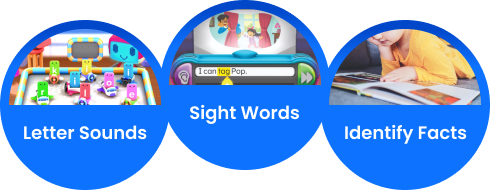

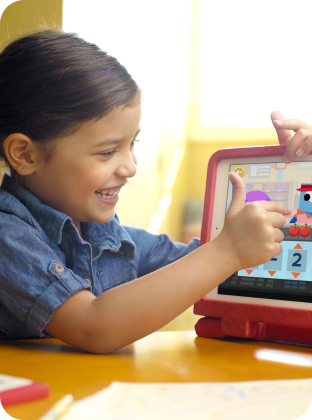
Kindergarten Math Curriculum
Our kindergarten homeschool math curriculum is designed to introduce young children to foundational mathematical concepts and develop their numerical understanding and problem-solving skills. It focuses on building a strong number sense, including counting, recognizing, and writing numbers, and understanding basic numerical operations like addition and subtraction.
Our math curriculum incorporates hands-on activities, interactive games, and fun videos to engage students and make learning math enjoyable. Through our adaptive math curriculum, My Math Academy®, kindergarteners can gain the skills necessary to navigate the mathematical world around them and establish a solid foundation for future math learning.
The Homeschool+ math curriculum covers a variety of math concepts for kindergartners. Here are a few examples:
- Counting sequences
- Composing numbers
- Comparing quantities
- Counting backward
- One-to-one correspondence and cardinality
- Addition and subtraction
Concepts Such As:
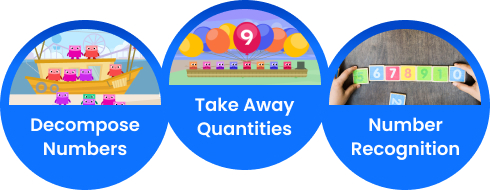
Kindergarten Science Curriculum
Our kindergarten science curriculum taps into the natural curiosity of young children and helps grow their excitement and understanding of the science that exists all around them. Through engaging lessons and hands-on experiences and activities, your child will delve into the marvels of the natural world and cultivate an interest in scientific inquiry.
Our curriculum encompasses a variety of age-appropriate science topics. Here’s a glimpse at a few of them.
- Discovering animal characteristics and their fascinating habitats
- Recognizing patterns in our surroundings and understanding cause-and-effect relationships
- Exploring significant cycles such as the water cycle, plant life cycle, and animal life cycle
- Developing an understanding of the environment and raising awareness of human impact
Lessons Such As:
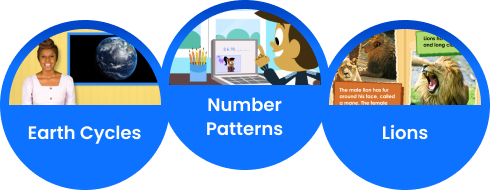

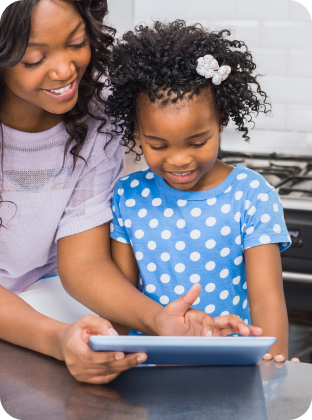
Kindergarten Social Studies Curriculum
Our kindergarten social studies curriculum immerses young learners in fundamental concepts of social studies, encompassing communities, diversity, maps and landmarks, and cultural awareness. Through captivating lessons and interactive activities, your child can cultivate an understanding of the world and embrace the significance of being an accountable global citizen.
The key areas emphasized in our kindergarten social studies curriculum include:
- Understanding how communities are alike and different by exploring culture, language, food, and money
- Discovering the concept of conservation and natural resources
- Learning about responsibility, including their role in caring for their body and the planet
- Uncovering human history and cultures and visiting landmarks and structures from around the world
Lessons Such As:
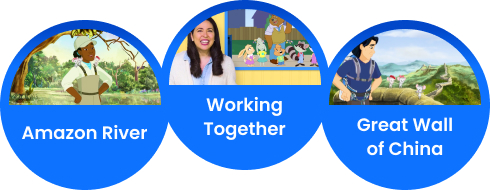
Kindergarten Art (Colors and Shapes), Music, and Spanish Curriculum
In our kindergarten art program, your child will discover the enchanting world of colors and shapes. Through online and offline activities, their imagination can soar as they unleash their artistic potential. Your child can enjoy creating unique masterpieces while gaining an understanding of shapes and the art of color mixing.
Our kindergarten music curriculum introduces your child to the magical realm of music, igniting a passion for rhythm, melodies, and basic piano skills. They can joyfully engage in musical exploration, fostering a lifelong appreciation for the captivating power of music.
Our kindergarten Spanish curriculum offers a fun introduction to the Spanish language. Through dynamic activities and interactive lessons, your child will learn vocabulary words, useful phrases, and more as they work towards discovering a new language.
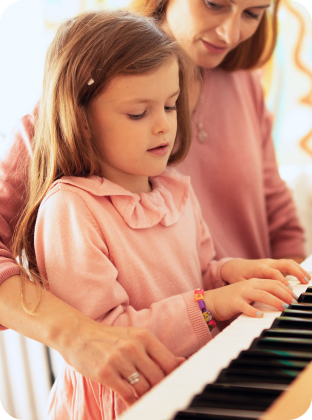
Why Use Homeschool+?
Homeschool+ provides you with online courses, lessons, and tools, combined with offline activities to support Your Homeschool, Your Way. As a home educator, you deserve a customized learning environment where your children can thrive and their love for learning can shine. Homeschool+ offers fully adaptive math and reading programs that adjust to your child in real time through dynamic, interactive assessments, as well as courses covering art, science, social studies, and more.
At Homeschool+, we are committed to providing robust tools to support your homeschooling adventure in whatever form works best for you. From Progress Tracking to Lesson Planning and organization, our extensive tools are designed to help make your journey seamless and successful. Join Homeschool+ today and unlock the potential of personalized education, your way!
Includes access for
up to three children
Your Homeschool,
Your Way.
Get your first 10
days free!
Then:
$299.99
renewing annually
until canceled
Save over 35% off
our monthly pricing
– or –
$39.99 per month
until canceled
Your Homeschool,
Your Way.
Get your first 10
days free!
Then $299.99
renewing annually until canceled
Save over 35% off
our monthly pricing
– or –
$39.99 per month until canceled